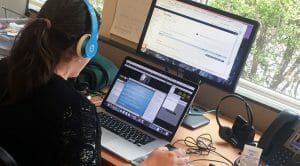
Editor’s Picks
In Coverage of Online Courses, Generalizations Prevail
By Henry Kronk
February 07, 2018
Last month, the New York Times published an Op-Ed by Professor Susan Dynarski, who teaches education, public policy, and economics at the University of Michigan. The headline reads “Online Courses Are Harming the Students Who Need the Most Help.” The story was well-researched, and made many salient points about K-12 students who both benefit and stagnate in online courses offered by their schools.
“[I]n so-called credit recovery programs,” Dynarski writes, “many students who have flunked a course in an old-fashioned classroom retake the class online. The negative consequences may not be obvious at first, because the pass rates in these courses are very high and students who take them tend to graduate from high school instead of flunking out. What could be wrong with that?”
“But there is something wrong with it. In reality, students who complete these courses tend to do quite poorly on subsequent tests of academic knowledge. This suggests that these online recovery courses often give students an easy passing grade without teaching them very much.”
Dynarski cites several studies which conclude that failing or poor-scoring students simply don’t learn effectively in online environments. Her evidence is compelling. The Op-Ed received attention and acclaim from people around the web, such as Ryan Craig who covers education for Forbes.
Every Online Course?
But many found Dynarski’s take to be tone deaf. The reason? Her title suggests she discusses all online courses, when in fact she’s addressing a fairly narrow area. As Pace University president Marvin Krislov points out in a letter the editor, “an important segment of online learners not mentioned are adult students looking to advance in their careers who are often juggling a full-time job and family responsibilities. A 2016 survey found that more than two-thirds of students felt time spent in online academic programs was worth it.” Adult learners aren’t just an important segment that Dynarski overlooked; they’re a much larger, more diverse, and more apt demographic for online learning.
 That point could be echoed for anyone who struggles with access to the education they seek. It applies to rural high school students who take online AP courses not offered in their school. It applies to individuals who spend the majority of their time raising a family or caregiving for an elderly relative, or a professional employed full-time who can’t travel to a new place to pursue an education. It also applies to the millions of learners in developing countries who can’t access certain forms of education.
That point could be echoed for anyone who struggles with access to the education they seek. It applies to rural high school students who take online AP courses not offered in their school. It applies to individuals who spend the majority of their time raising a family or caregiving for an elderly relative, or a professional employed full-time who can’t travel to a new place to pursue an education. It also applies to the millions of learners in developing countries who can’t access certain forms of education.
Given the context of the article, Dynarski seems to be right on the money. But accounting for the full scope of the term ‘online courses,’ she couldn’t be further from the truth.
MOOCs, For Example
The current rate of change in the field of education is astonishing. Take MOOCs, for example. They exploded in popularity in 2012. When the novelty wore off, MOOC providers began to note that a marginal percentage of the students taking the courses actually completed them.
In answer, Coursera transformed their offerings into a freemium model and saw completion rates jump to 60% for those who paid. Udacity followed suit and began to partner with businesses to train learners for specific roles. edX, meanwhile, sought to partner with as many universities as possible to create a truly massive catalog.
As Dhawal Shah, founder of Class-Central.com told me last November, “MOOC providers are a bit more sure than they were six years ago. They’re a bit more targeted. They’re no longer launching random experiments. They’re still doing experiments and tests, but it’s targeted at how to monetize or achieve certain business goals.”
“MOOCs have found their audience. It’s now mostly graduates and lifelong learners, people who take these courses for the sake of career benefit. Earlier this year someone did a study on Coursera and found that 89% of learners are above the age of 22.”
In other words, even the term ‘MOOC’ is reductive. It now refers to a highly diversified field of online course offerings instead of one specific form of online education. The term ‘online course’ is even broader.
When Professor Dynarski says that online courses harm the students who need the most help, then, the would-be beneficiary of a career-changing online education might think twice before jumping. And yet, Dynarski’s words do not apply in the least.
Many writers do not treat their subject matter with the same care that Dynarski shows. Others still misrepresent a field in order to market their own businesses. A significant challenge the education sector faces is that the burden of discerning the truth currently falls on the student and/or customer. So long as that occurs, many will continue to be misled.









No Comments